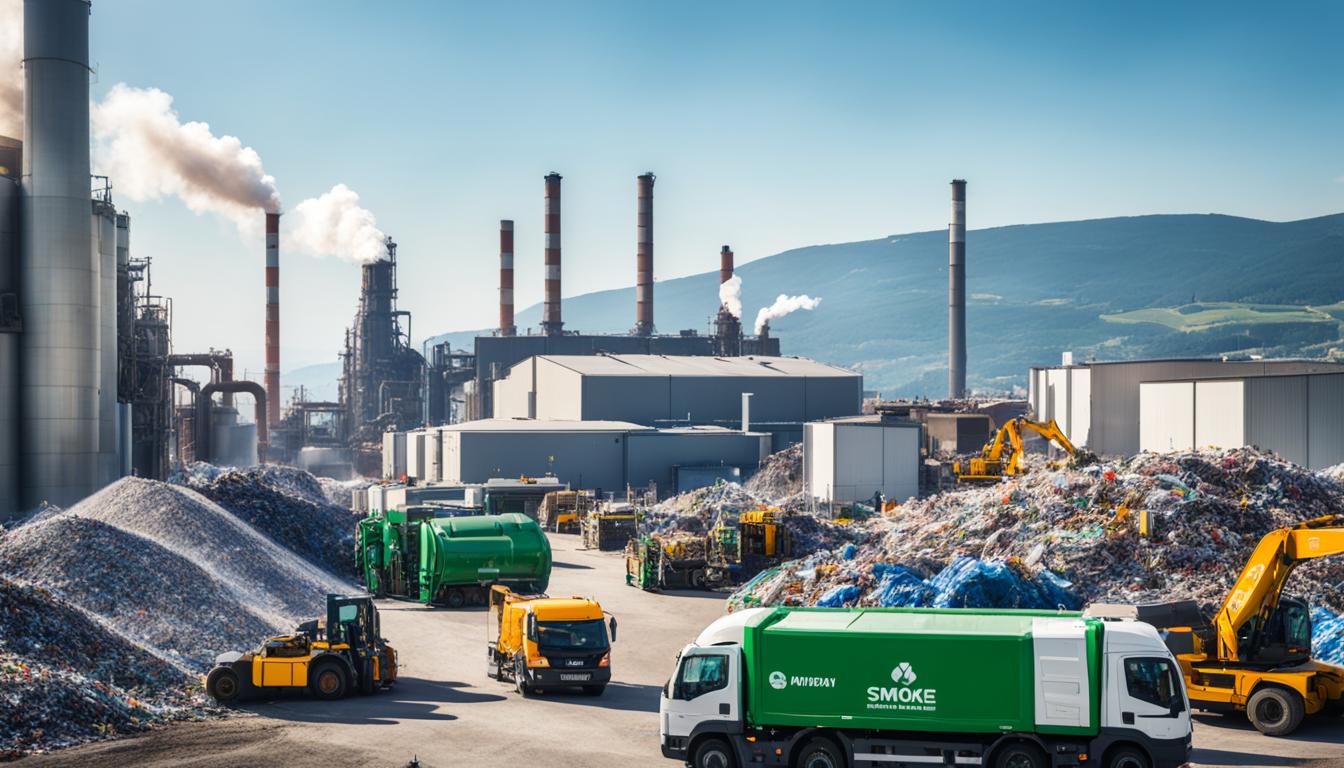“The greatest threat to our planet is the belief that someone else will save it.” – Robert Swan. This quote highlights the urgent need for action, especially in waste management. With environmental issues growing, starting a waste management business in Italy is crucial. Entrepreneurs with a vision can tap into the market’s opportunities, given Italy’s waste management challenges and rules.
This article will cover strategies for starting a business in waste management. We’ll look at the industry and how to follow the rules. It aims to help entrepreneurs wanting to make a difference in Italy’s waste management sector.
Key Takeaways
- The waste management sector in Italy is ripe for new businesses.
- Environmental sustainability is key in today’s business world.
- Knowing the local rules is crucial for success.
- Good business plans can help you stand out.
- Innovation and technology are important in modern waste management.
Understanding the Waste Management Industry in Italy
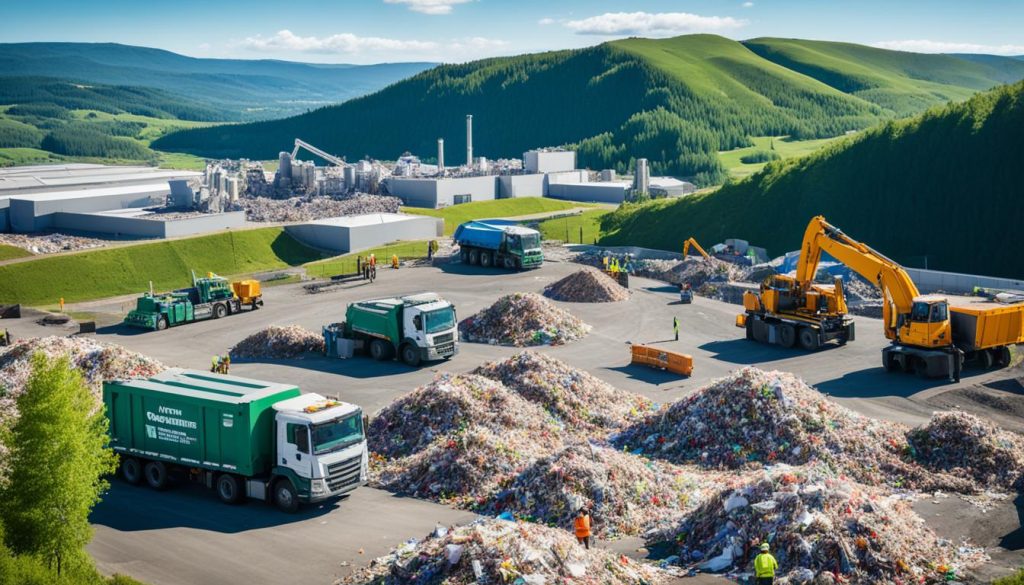
The waste management industry in Italy is crucial for tackling the rise in waste and promoting sustainability. It covers different types of waste, how they are disposed of, and following EU rules for cleaner environments. Knowing how this industry works helps businesses find effective waste management solutions.
Overview of Waste Management
Italy produces various types of waste like municipal, industrial, hazardous, and agricultural waste. Each type needs its own way of being processed and disposed of. The industry uses recycling, composting, incineration, and landfilling to manage these wastes well. Using modern technology makes these processes better, reducing harm to the environment.
Environmental Impact
Not managing waste properly harms the environment, affecting air, water, and soil quality. The industry in Italy must work to lessen these risks with better strategies. Following strict rules and choosing sustainable methods can greatly lessen the harm to the environment. It’s vital to handle waste responsibly as it affects public health and nature.
Market Analysis: Opportunities and Challenges
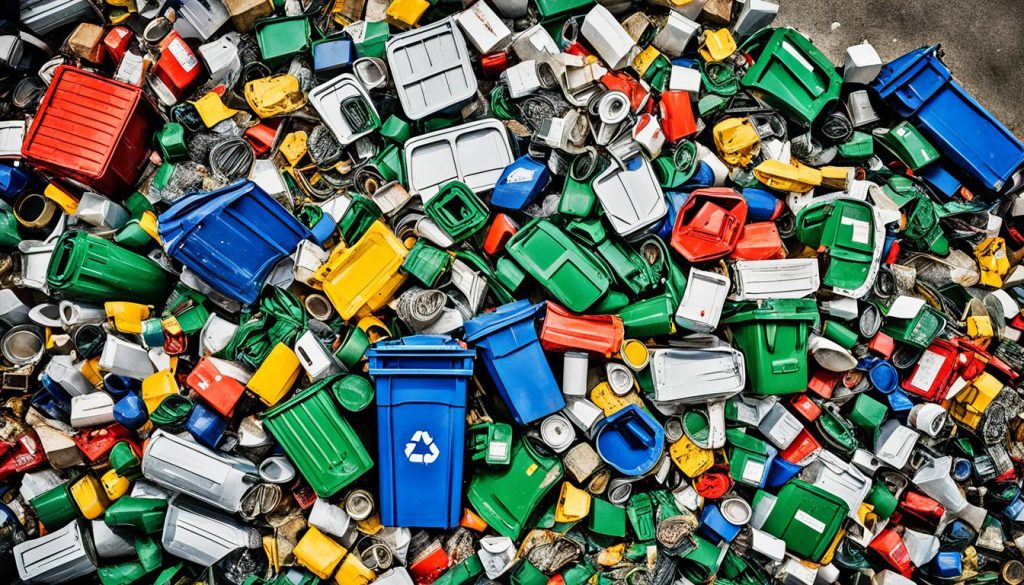
Looking closely at the waste management sector in Italy shows us big chances for growth. Entrepreneurs can spot trends like recycling and waste-to-energy tech. These areas offer great chances for businesses wanting to help the planet.
Current Market Trends
Now, there’s a big push for green practices in waste management. New tech like robotic sorters and better recycling is becoming popular. The main trends are:
- More money going into recycling plants
- More composting projects
- New waste-to-energy projects
- Better awareness among the public about waste handling
This focus on the environment also opens up new ways for businesses to make money. As more people want eco-friendly services, it’s a great time for new entrepreneurs.
Potential Challenges
Even with the good news, there are hurdles in Italy’s waste management market. It’s important to know these issues to plan well. The main challenges are:
- Competition from big companies
- Tough rules to follow
- Public doubts about waste management
- Changes in the market due to the economy
To overcome these issues, entrepreneurs need a strong plan. They must make sure their business follows the rules and builds trust with the public.
Key Regulations for Waste Management in Italy
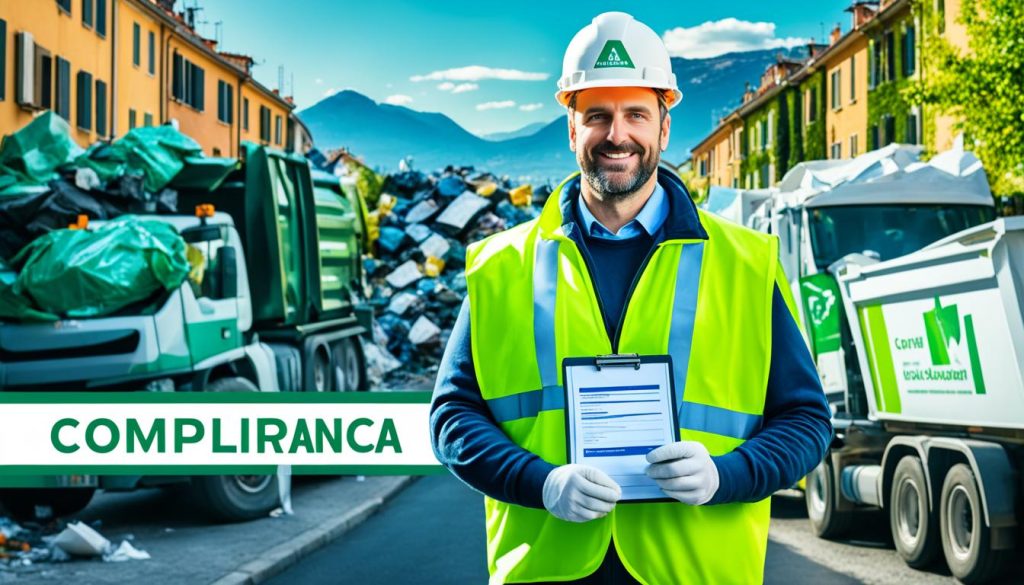
In Italy, it’s vital for businesses to know the waste management laws. These laws come from national and European Union rules. Following these laws makes sure you’re legal and helps the environment.
Businesses need to understand several parts of waste management laws, such as:
- Licensing procedures that govern the operation of waste management facilities.
- Classification of waste to ensure proper handling and disposal methods.
- Reporting requirements that mandate regular submissions of waste management activities to appropriate authorities.
If you don’t follow these laws, you could face big fines. So, it’s key to know the waste management laws in Italy well. This knowledge helps you stay legal and makes your business successful.
How to Create a Comprehensive Business Plan
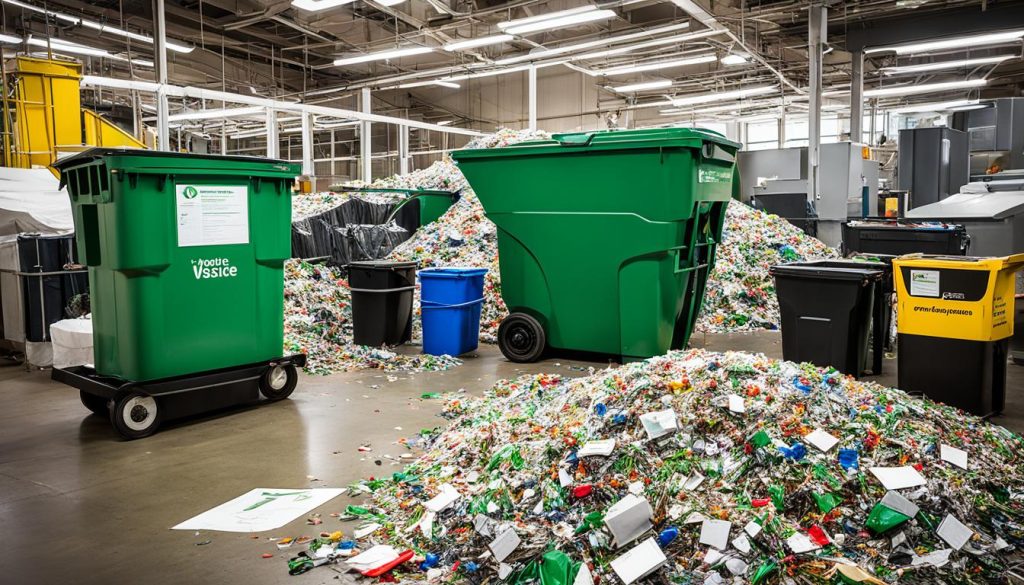
Creating a strong business plan is key for a waste management business’s success. It acts as a guide, helping with strategic planning and day-to-day operations. Here are the main parts to add to your business plan:
- Market Research: Do deep research to grasp the waste management industry’s current state. Find out who your competitors are, who your customers could be, and who you want to reach.
- Financial Projections: Make detailed forecasts of your income, costs, and profits. Clear numbers make your plan more believable to potential investors.
- Marketing Strategies: Explain how you’ll draw in customers. Talk about your promotional plans and how you’ll share the special benefits of your waste management service.
- Risk Assessment: Spot possible risks and challenges in the waste management field. Come up with ways to lessen these risks.
- Vision and Operational Strategy: Share your business’s clear vision and describe how you’ll run it. This will help with your strategic planning.
Adding these parts to your business plan will make your operations clear and build trust with partners and investors. A well-planned plan is a strong base, guiding your waste management business to success.
Choosing the Right Business Structure
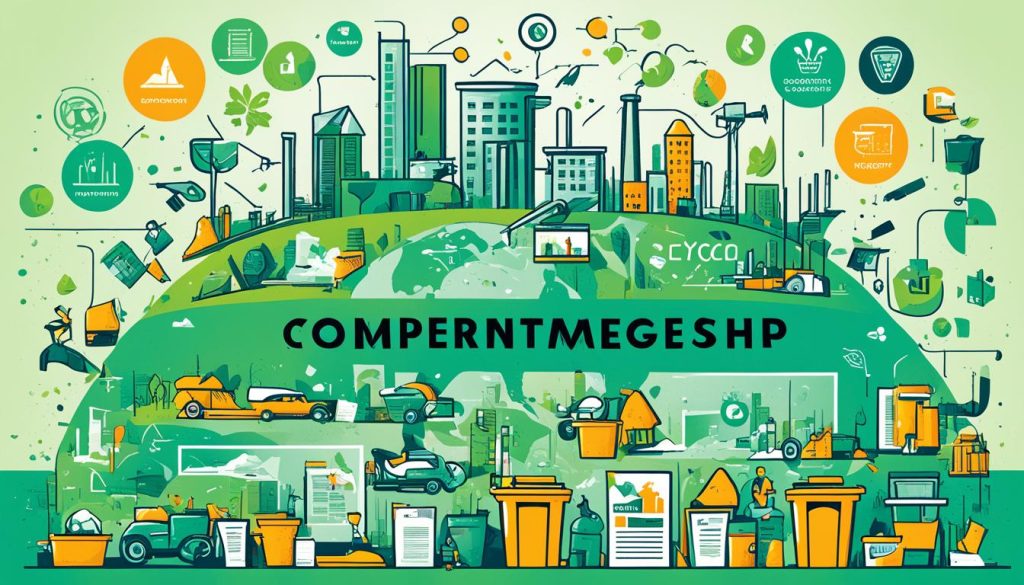
Choosing the right business structure is key for a waste management company in Italy to succeed. Each structure has its own pros and cons. These affect how the business runs and the legal duties it has.
The main types of business structures are:
- Sole Proprietorship: This is easy to start and lets the owner make all the decisions. But, the owner could face unlimited financial risks.
- Partnership: Here, two or more people share the work and profits. But, all partners are on the hook for any business debts.
- Limited Liability Company (LLC): An LLC protects the owner’s personal assets, making it a top choice. It’s great for waste management firms because it’s flexible and trusted.
When thinking about setting up a business, consider things like taxes, liability, and how big the waste management business will be. Each structure has different legal and financial demands. It’s important to pick one that fits the company’s aims.
Funding Options for Your Waste Management Business

Starting a waste management business means knowing about different ways to get money. It’s key to have enough funds to do well in this field.
There are many ways to get funding, such as:
- Government Grants: Many local and national programs help green projects. They give money to new waste management start-ups.
- Loans: Banks and other lenders offer loans for small businesses, including waste management ones.
- Private Investors: Finding investors who like your idea can boost your funding and add valuable skills to your team.
EU funding for the environment is also a big help. These funds support projects that reduce waste, recycle more, and use new tech. It’s a great chance for new businesses to get more money.
Knowing about these funding options helps entrepreneurs make smart choices. This way, they can start and keep their waste management business going.
Setting Up Your Operations and Infrastructure
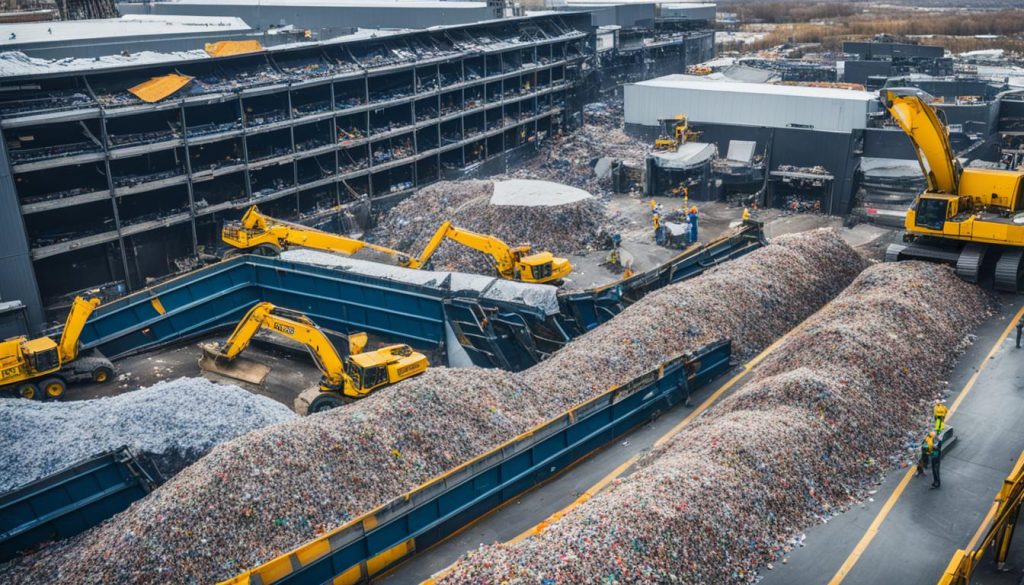
The success of a waste management business relies on a good operations setup and strong infrastructure. Choosing the right location is key. Look for a spot that’s easy to get to, has good waste collection services, and is close to where waste is processed. The right location can make your service better and save on transport costs.
Getting the right waste collection vehicles and equipment is vital. These must meet legal standards and fit the waste types you handle, like recyclables and dangerous materials. Investing in modern sorting and processing machines can make your operations more efficient, saving money over time.
Logistics are crucial for managing your operations. A good logistics plan ensures waste is collected on time and routes are the best they can be. This cuts down on fuel use and pollution. Keeping an eye on things and using waste management software can make things run smoother.
In short, setting up your operations well means careful planning of where you’ll be, what you’ll use, and how you’ll manage logistics. Focusing on these areas will help you build a sustainable waste management business.
Technology and Innovation in Waste Management
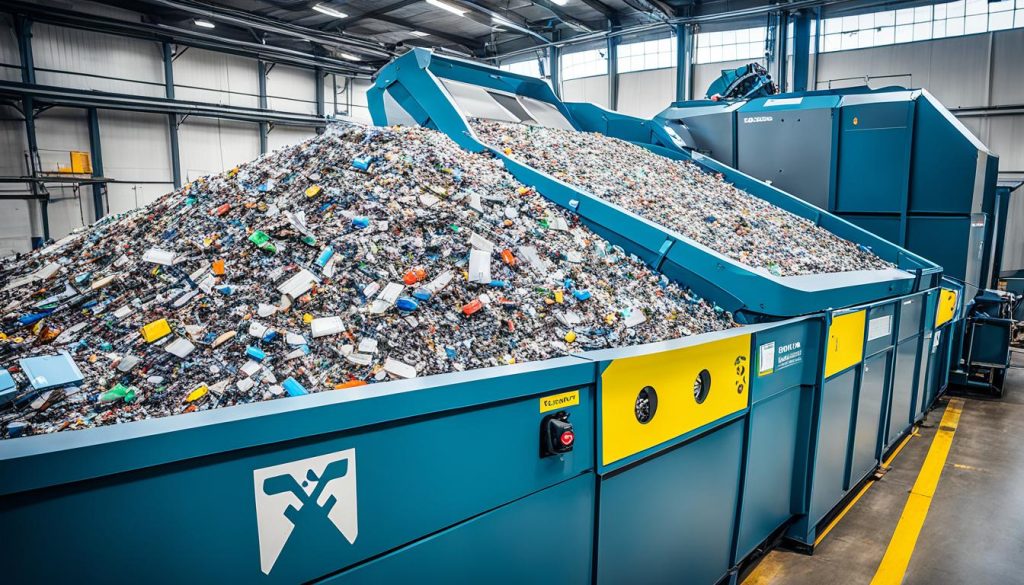
Waste management technology is key to making the industry more efficient and sustainable. It brings new ways to process and recycle waste. This has led to big changes in how waste is handled.
One big step forward is in waste sorting technology. Now, machines with AI and robotics sort recyclables from non-recyclables. This makes recycling better and saves a lot of time and effort.
There’s also a push for recycling innovations. For instance, TerraCycle has found ways to recycle things that were hard to recycle before. This helps cut down on landfill waste and supports a circular economy.
Data analytics is another big part of the industry’s growth. It helps companies understand waste patterns better. This leads to smarter use of resources and lower costs. It also helps businesses make quick decisions, keeping up with new rules and market changes.
- Enhanced sorting methods increase recycling rates.
- Innovative recycling processes reduce landfill reliance.
- Data analytics improve operational efficiency.
The future of waste management is all about technology and new ideas. As companies use these new tools, waste management will get better and greener. This will help the planet and make businesses more successful over time.
Marketing Strategies for Your Waste Management Business

Creating strong marketing plans is key for a waste management business. It’s important to connect with customers and show your brand’s value. By understanding what the community needs and cares about, you can make campaigns that really speak to them.
Here are some ways to make your brand stand out:
- Community Outreach: Join local events and run workshops on recycling and reducing waste. This builds relationships with potential customers.
- Digital Marketing: Use social media to share tips on sustainable waste management. Pictures and videos grab people’s attention.
- Partnerships: Work with local businesses and groups focused on being green. This helps you reach more people and look more credible.
- Customer Feedback: Always ask customers what they think to find ways to get better. This makes customers feel heard and helps you offer what they want.
- Branding in Environmental Responsibility: Show that your waste management business cares about the planet. Talk about new methods or tech you use to be more sustainable.
Using these strategies will help promote your business and connect with customers deeply. A brand that cares about the environment will draw in customers who support your efforts.
Building Relationships with Local Authorities
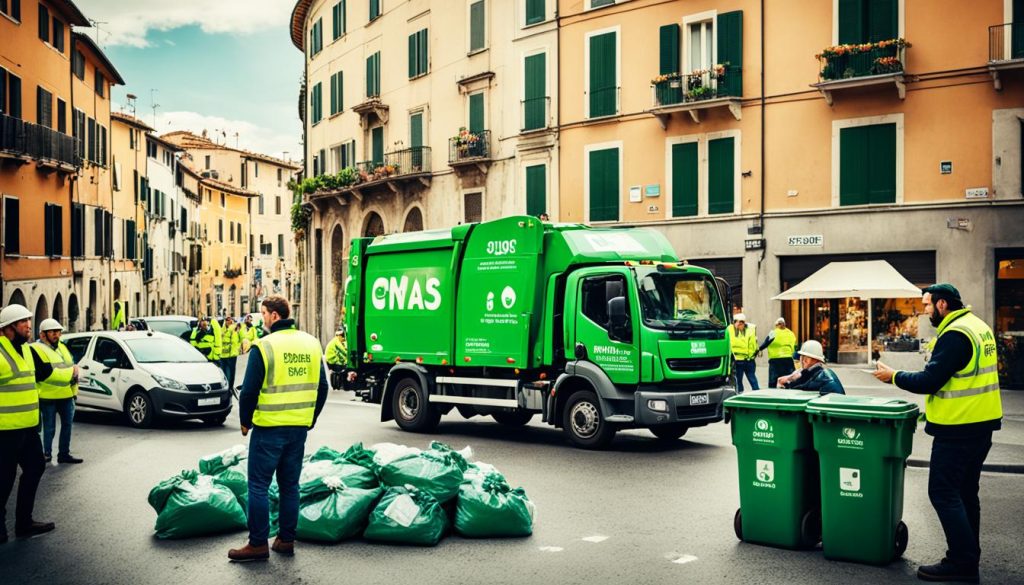
It’s key to build strong ties with local authorities for a waste management business to thrive. Working together can make things run smoother and build trust in the community.
Here are ways to improve these relationships:
- Engagement in Local Community Initiatives: Joining in on community projects shows you care and can make your company look good.
- Regular Communication: Keeping in touch with local authorities helps solve problems fast and keeps everyone on the same page.
- Understanding Local Regulations: Knowing the local laws about waste management is vital. It helps businesses avoid legal trouble.
- Assistance with Permits: Working with local authorities to get permits can make things easier and make your business look legit.
As waste management partnerships grow, it’s more vital to connect with local authorities. These relationships help you deal with laws and gain community support. This creates a strong base for lasting success.
Considerations for Hiring and Training Staff
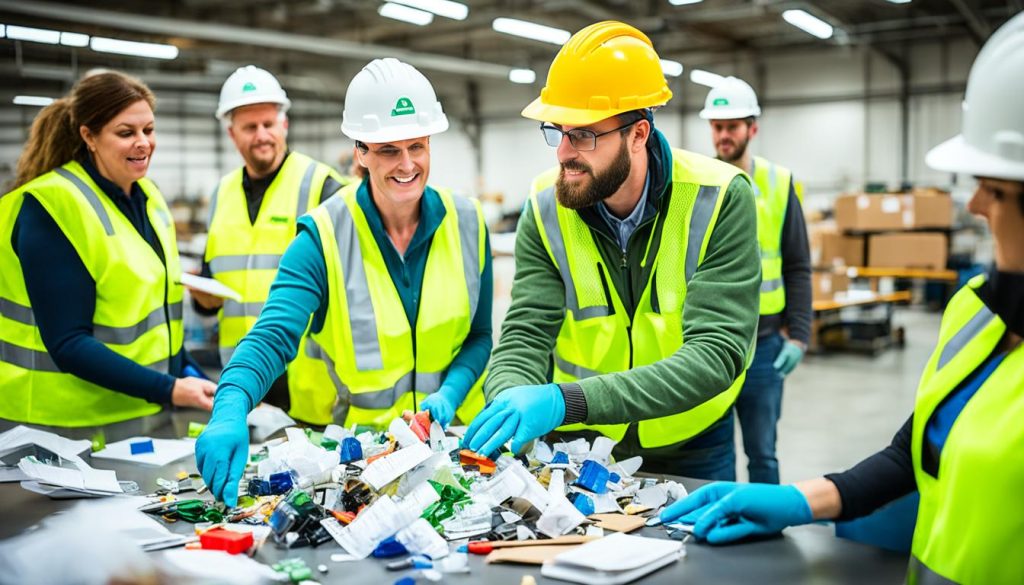
Hiring for waste management needs a careful look to meet industry standards and rules. It’s key to check candidates’ skills and their dedication to the environment. Skills needed include solving problems, being physically fit, and good at communicating to work well in a team and stay safe.
Training is vital for a skilled team. A good training plan should cover:
- Safety steps to cut down on accidents and keep workers safe.
- Training on rules for waste disposal at local and national levels.
- Learning how to use equipment and technology in waste management.
- Training on sustainable practices to meet environmental goals.
Putting a focus on training helps build a sustainable work culture. It boosts employee involvement and makes the business run better. Hiring and training staff well prepares a team to handle the waste management industry’s challenges.
Implementing Sustainable Practices in Waste Management
To make waste management in Italy last longer and work better, using sustainable practices is key. Recycling programmes are a big part of this, helping to cut down on landfill use. Companies like Veolia use new recycling methods that boost recovery rates and support a circular economy. By recycling more, businesses can lessen their impact on the environment and help save resources.
It’s also crucial to focus on reducing waste. This means looking at how operations work to find ways to make less waste. Iren has shown great success by cutting waste through smart strategies, promoting a culture of efficiency. Using technology helps track and manage waste better, making it easier to make informed choices.
Corporate social responsibility (CSR) is also vital in waste management. Working with local communities and schools to teach about recycling and waste sorting can increase environmental awareness. This not only improves a company’s image but also shows a real commitment to the planet. It helps attract customers who care about the environment and want to support eco-friendly businesses.

